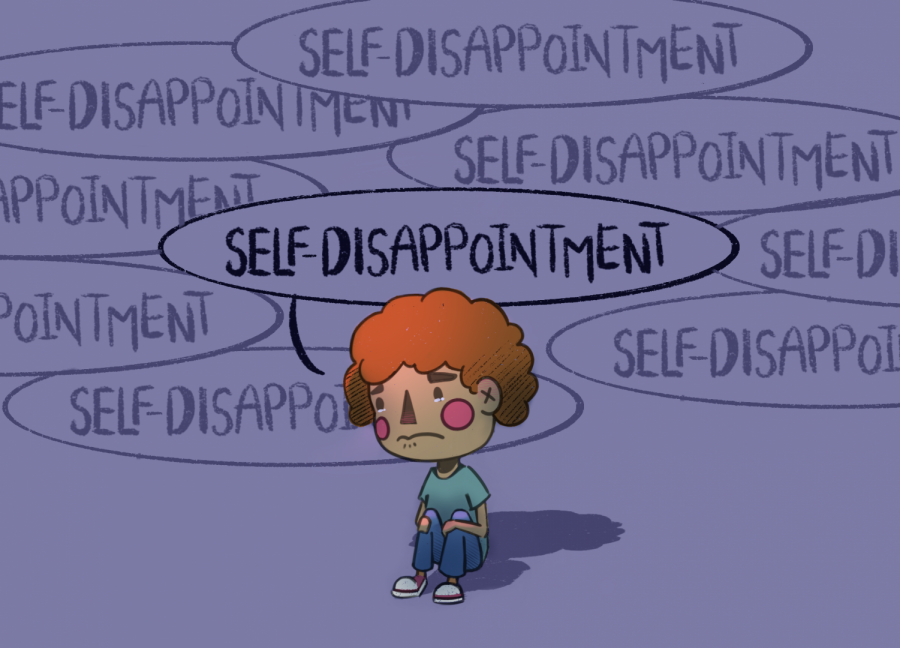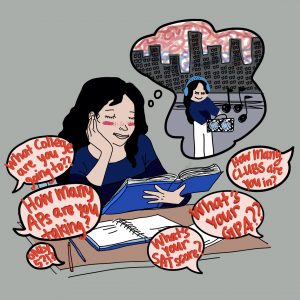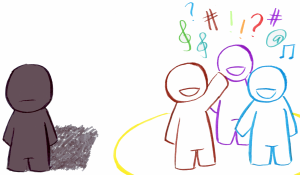Self disappointment plants a never-ending cycle in freshmen’s minds
Even with the lesser amount of APs and honors classes, freshmen still experience self disappointment.
June 3, 2021
Ranting to my friend on FaceTime about a math test, I talked about how bad I did, expressing how stressed I was for doing so poorly. Attempting to make me feel better, my friend jokingly asked, “When was the last time you felt disappointed in yourself?” and while laughing, I answered, “This morning.”
Although we were just joking around, I suddenly wondered if it was disappointment or stress I was feeling, and realized that it was disappointment coming from the high expectations I set for myself. But I know I am not the only one feeling disappointed in myself from school—many of the people around me are as well.
While talking to my friends, who are also spending their first year of high school through a screen, they express how they blame themselves harshly for a grade that others might consider as a good grade.
Self disappointment can be described in many ways. The simplest definition, of course, is stress and displeasure coming from the failure to live up to standards set by oneself. Many students set goals that are achievable, but end up stressing too much about it by thinking it as impossible. This is probably something that almost all students have experienced before.
Going from middle school to high school itself was a big change, but with remote learning, students, especially freshmen, have been having a hard time socializing and bonding with both their classmates and their teachers. Furthermore, the number of students with a D or a F in certain classes were shown to be increased with the start of remote learning.
“I have high expectations for myself, and I would fixate on making things perfect, but would get quite stressed when I could not do those things,” said Fiona Huang, a freshman at Dougherty Valley High School. She expressed how the lack of socialization can emotionally cause disappointment in a person because it can be an outlet of stress for both introverts and extroverts, and emphasized how these reasons also disconnect her from others.
The combination of limited socialization with friends and classmates and the time that would’ve been spent talking to friends in a physical classroom being filled with classwork caused many freshmen to experience stress and self disappointment.
“High school itself is hard, it’s such a big leap from 8th grade. We aren’t prepared for this workload, and the standards are much harder,” says Meghana Reddy, a freshman at Dougherty Valley High School. “Since this is an online school, many kids find it hard to reach out to teachers openly. The pressure that we once could tolerate becomes worse as things keep piling on.”
However, both students and teachers alike know that the later years of high school are hard- with the higher levels of classes, it is impossible for it not to be. They may also think that it is better to be used to these types of emotions earlier, so that students can manage them better once they start taking the advanced classes.
While this can be true, not every student will feel this way, and research shows that there has been a definite increase in teens (in secondary and tertiary schools) receiving stress, increasing so much that there are more stressed students than adults.
The difference in the workload students get, along with the student’s job of communicating with their teachers when they need help, plays a vital role in how ninth graders adapt to the new school. However, with online school, many expressed that the disappointment coming from schoolwork can depend on a teacher’s ability to effectively help the students.
“Whether or not you get a teacher who is prepared to teach effectively in this environment plays a vital role. The combination of lack of socializing, certain stressful expectations and sitting in front of a computer all day can be suffocating,” says Huang. “Without a teacher’s organizational ability and sentiment, students can fall short of their educational needs; therefore, making students disappointed in themselves. ”
Schools can cause so much stress for the students; most of it comes from expectations set by oneself. The high expectations that seemed to be easy are ones that become harder to do as time passes.
“Grades are the number one reason [behind the stress],” says Reddy, “Every time we look at our grades, if it is below our standards, we immediately stress out about it. I think that it’s the pressure put on us by ourselves, and the disappointment can really put us down.”
Self disappointment comes from a variety of reasons, but for freshmen, the change in workload and difficulty impacts them the most. What we as students really need is a break from the work – With the absence of socialization, it causes them to fall into a never-ending cycle of setting high expectations, then blaming themselves for doing bad, when it should be just better to take a deep breath and move on.




